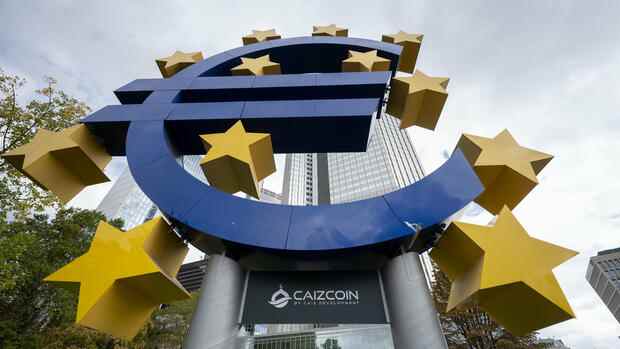Washington According to insiders, monetary authorities at the European Central Bank (ECB) recently discussed a timetable for the future reduction of their multi-trillion bond portfolios. A start date for the reduction of stocks in the second quarter of 2023 had been put forward, three insiders told the Reuters news agency. An ECB spokesman declined to comment on the information. The central bank’s balance sheet has now swelled to almost nine trillion euros as a result of the bond purchase programs worth billions in recent years. Balance sheet reduction by reducing bond holdings is known in the industry as “quantitative tightening” (QT).
So far, the ECB has held out the prospect of replacing expiring bonds from its APP purchase program with new bonds for a longer period of time, even after the first interest rate hike. The monetary authorities want to continue these reinvestments for as long as necessary to ensure ample liquidity and to maintain “an appropriate monetary policy stance”. The ECB could adjust its language on replacing expired bonds as early as its October meeting, the insiders said. A detailed plan could then be presented possibly in December, but more likely still in February.
At a recent meeting of ECB monetary authorities in Cyprus, a presentation cited an end to full reinvestments in the second quarter of 2023. Some currency watchdogs would have given earlier dates, others would have spoken out in June. Holdings would be reduced because the funds from expired bonds would then no longer be fully reinvested. The ECB would proceed very flexibly. People familiar with the situation said there were no plans to sell the bonds directly.
The currency watchdogs agreed in their assessment that the financial markets are currently tense. Therefore, confronting investors with a premature reinvestment plan makes no sense, the insiders said. The recent stock market turmoil in Britain, which prompted the Bank of England to intervene, would have alarmed some policymakers and strengthened the case for a cautious approach. Supporters of tight monetary policy also seemed to agree. Because interest rate hikes are currently a priority for them. Some policymakers feared that if balance sheet reductions begin soon, it could be used as an argument for slowing rate hikes, insiders said.
Top jobs of the day
Find the best jobs now and
be notified by email.
The schedule has not yet been decided. There could still be changes, it said. Discussions are at an early stage. The presentation was not a monetary policy proposal. As those familiar with the discussion pointed out, the discussion does not concern the trillion-dollar pandemic emergency program PEPP. This program aims to replace expiring bonds by at least the end of 2024. According to the insiders, the currency watchdogs have no interest in making changes to this.
ECB currency guardian Kazaks for another XXL rate hike in October
In the view of Latvia’s head of the central bank, Martins Kazaks, the European Central Bank should decide on another XXL interest rate hike in October in the fight against high inflation. According to Kazaks, another hike in the deposit rate by 0.75 percentage points, as in September, makes sense, he told Reuters on Thursday on the sidelines of the International Monetary Fund (IMF) annual meeting in Washington. “A big step at the next meeting is warranted and I think 75 basis points is reasonable,” Kazaks said. The next ECB interest rate meeting is on October 27th. “In December we can also take a significant big step, but whether it will be 50, 75 or something else is up for debate,” added the ECB Governing Council member.
After that, the rate hikes could be smaller and flanked by further monetary policy measures, said the currency watchdog. According to Kazaks, this could also include a reduction in bond holdings, which have swelled sharply as a result of the purchase programs of recent years. Bundesbank President Joachim Nagel spoke out in Washington on Thursday in favor of starting to reduce bond holdings in 2023.
The ECB initiated the turnaround in interest rates in July and has so far raised its three key interest rates in two steps by a total of 1.25 percentage points. The key interest rate is now 1.25 percent. And the deposit rate that is currently relevant for the financial markets is currently 0.75 percent. The stock exchanges are currently expecting that the deposit rate will be raised to around two percent by the end of the year and then raised further to around three percent in spring 2023.
Kazaks also argued that while governments should now provide targeted fiscal support to help the most vulnerable in society. But there is a risk that monetary policy and fiscal policy will drift apart. “Fiscal policy must not contribute to inflationary pressures, and that’s a fine line to walk,” warned Kazaks. Fiscal policy must be aware of its impact. Governments must help the less affluent sections of society. “But they must not overdo it, because then we will have to raise interest rates further.” And this would increase the risks for financial stability, for example.
More: Different views in the ECB on the monetary policy course
